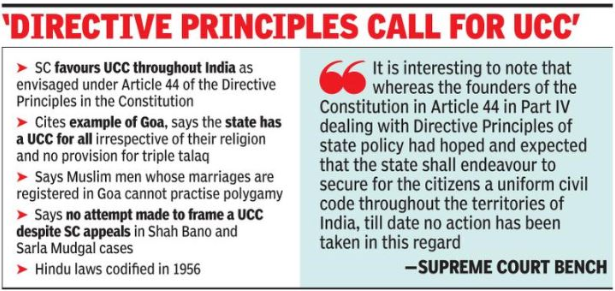Description

Copyright infringement not intended
In News
- A Private member introduced The Uniform Civil Code (UCC) in India Bill in the lok sabha for the constitution of the National Inspection and Investigation Committee.
About Uniform Civil Code
- Uniform Civil Code comes under Article 44 of the Indian Constitution, which lays down that the state shall aspire to secure a Uniform Civil Code for the citizens throughout the territory of India.
- The Uniform Civil Code (UCC) calls for the formulation of one law for India, which would be applicable to all religious communities in matters such as marriage, divorce, inheritance, and adoption.
Origin of Uniform Civil Code
- The origin of the UCC dates back to colonial India when the British government submitted its report in 1835 stressing the need for uniformity in the codification of Indian law relating to crimes, evidence, and contracts, specifically recommending that the personal laws of Hindus and Muslims be kept outside such codification.
- An increase in legislation dealing with personal issues at the far end of British rule forced the government to form the B N Rau Committee to codify Hindu law in 1941.
- The task of the Hindu Law Committee was to examine the question of the necessity of common Hindu laws.
- The committee, in accordance with scriptures, recommended a codified Hindu law, which would give equal rights to women.
- The committee recommended a civil code of marriage and succession for Hindus.
- The Hindu Code Bill
- The draft of the Rau Committee report was submitted to a select committee chaired by B.R Ambedkar that came up for discussion in 1951 after the adoption of the Constitution.
- While discussions continued, the Hindu Code Bill lapsed and was resubmitted in 1952.
- The bill was then adopted in 1956 as the Hindu Succession Act to amend and codify the law relating to intestate or unwilled succession, among Hindus, Buddhists, Jains, and Sikhs.
- The Act reformed the Hindu personal law and gave women greater property rights, and ownership.
- It gave women property rights in their father's estate. The daughter is allotted the same share as is allotted to a son.

Arguments in Favour of Uniform Civil Code
- A Secular republic needs a Common law for all Citizens rather than differentiated rules based on religious Practices.
- Courts also Suggested in their judgements that the government should move toward a uniform civil code including the judgement in the Shah Bano Case.
- It will address the discrimination against vulnerable groups and harmonise diverse cultural groups across the country.
- Ensure gender justice, and promote women empowerment.
- The code will simplify the complex laws around marriage ceremonies, inheritance, succession, and adoptions making them one for all. The same civil law will then be applicable to all citizens irrespective of their faith.
- Dr B R Ambedkar, while formulating the Constitution had said that a UCC is desirable but for the moment it should remain voluntary, and thus it was added as a part of the Directive Principles of the State Policy in part IV of the Constitution of India as Article 44.
Arguments against Uniform Civil Code
- Cultural diversity cannot be compromised to the extent that our urge for uniformity itself becomes a reason for a threat to the territorial integrity of the nation.
- Diversity, both religious and regional, Should not get subsumed under the louder voice of the majority.
- Article 25 of the Indian constitution preserves the freedom to practise and propagate any religion that gets into conflict with the concepts of UCC.
- Fundamental Rights v/s DPSPs: Fundamental rights are justiciable whereas DPSPs are non-justiciable and optional for the state.
- The demand for a uniform civil code has been framed in the context of communal politics. A large section of society sees it as majoritarianism under the garb of social reform.
Way Forward
- Discriminatory practices within a religion should be eliminated.
- The achievement of a uniform civil code becomes more desirable when it comes to the diversity of the matrimonial laws, simplifying the Indian legal system and making Indian society more homogeneous. The uniform civil code will envisage uniform provisions that will be applicable to everyone and which will be based on social justice and gender equality in family matters.
- By Codification of different Personal laws, we can arrive at Certain universal Principles that promote equity.
- The UCC aims to provide protection to vulnerable sections as envisaged by Ambedkar including women and religious minorities, while also promoting nationalistic fervour through unity.
- The code will simplify the complex laws around marriage ceremonies, inheritance, succession, and adoptions making them one for all. The same civil law will then be applicable to all citizens irrespective of their faith.
https://www.thehindu.com/news/national/mention-of-private-members-bill-by-bjp-members-on-ucc-repeal-of-places-of-worship-act-1991-sees-protest-by-opposition-in-rajya-sabha/article65671167.ece
1.png)
https://t.me/+hJqMV1O0se03Njk9













